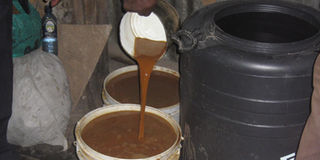Bars get licences to sell chang’aa

Drums of illicit brew at the scene of a raid conducted in Murang'a. Photo/FILE
The government on Sunday moved to legalise chang’aa brewing as it gave bar owners and persons dealing in alcohol three weeks to acquire new licenses.
This follows the constitution of District Regulation Committees, under the Alcoholics Drinks Control Act, 2010 to issue licenses.
The issuance of licenses was suspended in December last year, awaiting the constitution of the committees.
The committees will be charged with licensing traditional brewers, importers, distributors and sellers of alcohol.
National Agency for the Campaign Against Drugs (Nacada) acting coordinator, Mr Aggrey Busena, said guidelines for brewing chang’aa have been prepared and will be gazetted soon by the minister for Industrialisation.
“The standards will regulate ingredients, the brewing process and packaging,” he said.
The committees will be dominated by women as the law stipulates that the minister appoints three residents, two of them women, to the regulatory committees.
This will give them room to control alcoholism, a vice they have campaigned against for long.
The committees will also include the district commissioner, district medical officer of health, Officer Commanding Police Division, a nominee from each local authority in the district and the secretary to the committees nominated by the Government.
“If the holders of the posts are women, this increases their number,” said Nacada chairman Dr Njenga.
He challenged brewers, importers and marketers to seek licences early to avoid last minute hitches.
Also to be announced are regulations for promotions and advertisement of alcoholic products.
A licence for selling alcohol products in cities and municipalities will cost Sh50,000 annually, and Sh30,000 in other urban areas.
Bar owners outside urban areas will pay Sh15,000 per year.
“We are receiving good reports that now young men can be seen going to work in farms in many rural areas. There are however, some who still continue to violate the law but we will catch up with them eventually,” Dr Njenga said.
He dismissed complains that the opening hours are hurting bar and hotel businesses.
He said the law offers categories of licences for operators to choose from, each with different operating hours.
The fourth schedule to the Act allows general beer retailers to operate from 5pm to 11pm on weekdays, and from 2pm on weekends and public holidays.
Supermarkets are allowed to sell alcohol from 10am to 8.30pm. Hotels are exempted from the restrictions.
The operators however pay a higher fee for licences, with supermarkets within cities and municipalities paying Sh80,000 annually, urban areas Sh50,000 and outside urban areas, Sh30,000.
Hotels are required to acquire licences at Sh50,000 per year in cities and municipalities, Sh30,000 in towns and Sh20,000 outside urban areas.
When the law took effect, the Murang’a Bar Operators Association moved to court claiming it would cripple their operations.
The case was struck out by Justice Daniel Musinga a few days after another judge, Justice John Mwera, issued interim orders




